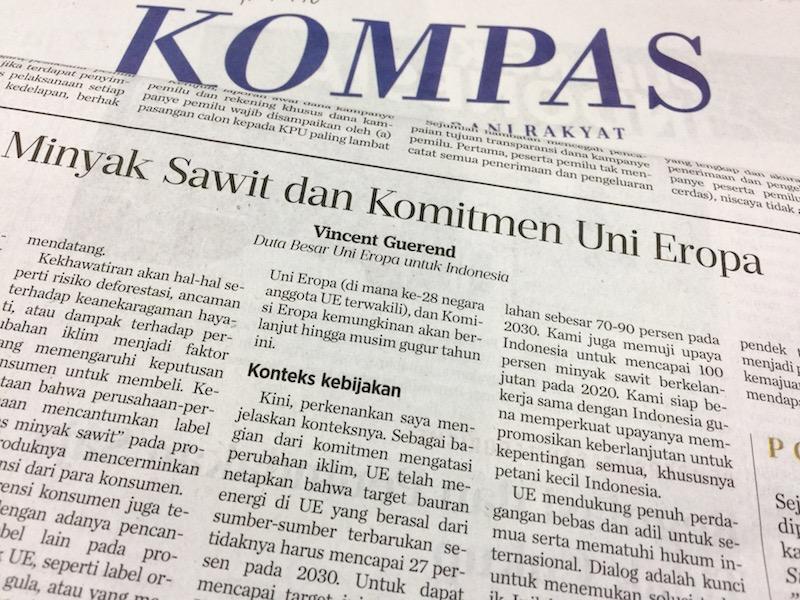Palm Oil: Opportunities to live up to our commitments

Kompas daily newspaper published an opinion article by H.E. Vincent Guérend, EU Ambassador to Indonesia, titled "Minyak Sawit dan Komitmen Uni Eropa" on 5 June 2018.
Here's a translation of the op-ed:
Palm Oil and EU's Commitment
By Vincent Guérend, EU Ambassador to Indonesia
Much has been written and said in recent months about a purported European Union (EU) ban on palm oil, retaliatory measures leading to trade wars and how the EU would undermine Indonesia's efforts to reduce poverty or promote sustainability.
Please allow me to explain the position of the EU: Firstly and most importantly, there is no EU ban on palm oil and no plan to introduce one. The EU is by far the second-largest export market for Indonesian palm oil, with significantly lower tariffs than other markets. Furthermore, Indonesian palm oil exports to the EU increased by 27% in 2017 compared to 2016. Secondly, what is frequently described here as a "black campaign" against palm oil is an expression of the genuine environmental concerns of consumers as well as manufacturers. Informed consumers (in the EU and elsewhere) increasingly favour healthier, fairer and more-sustainable consumption patterns: recycling waste, using canvas rather than plastic bags, buying locally grown produce and so on. Preserving our planet for future generations is at the core of these patterns. Such concerns as a perceived risk of deforestation, threats to biodiversity or the impact on climate change influence consumers' purchasing decisions. The fact that some companies label products as palm-oil free reflects those consumer preferences. The same could be said for organic, sugar-free or GMO-free labels on EU products.
Why are we here? The concern about climate change and biodiversity loss is not new. But it is growing. What is new is that the European Commission has proposed to limit to 3.8% the share of all crop-based biofuels that count towards the EU target for renewable energy. On his side, the European Parliament - one of the EU law-making institutions - voted in February to no longer include, as from 2021, biofuels and bio-liquids produced from palm oil for the purpose of calculating the share of renewable energy. No final decision has been taken yet. Negotiations between the European Parliament, the Council of the EU (where the 28 EU Members States are represented) and the European Commission will likely continue until the autumn.
Let me explain the context. As part of its own climate commitments, the EU set itself a target to have at least 27% of energy consumed in the EU come from renewable sources by 2030. To achieve this objective, the European Commission proposed in 2016 to revise EU legislation on renewable energy to reduce the carbon footprint of the transport sector, among others. Why? We realised that after some years of promoting the use of crop-based biofuels, the increased demand produced undesirable land-use changes affecting the traditional production of crops for food and feed as well as sensitive areas such as forests, wetlands and peatlands. That was causing massive greenhouse gas emissions, eventually offsetting the intended emission savings from crop-based biofuels.
Now, let me address palm-oil sustainability. The EU welcomes and actively supports Indonesia's target to reduce land-use greenhouse gas emissions by 70-90% by 2030. We also commend Indonesia's own efforts towards 100% sustainable palm oil by 2020. We stand ready to work with Indonesia on strengthening its efforts to promote sustainability for the benefit of all, in particular Indonesian smallholders.
The EU stands for free and fair trade for all and is abiding by international law. Dialogue is key to find the best solution. That's why the visit of 13 Members of the European Parliament to Jakarta early May was so important. That is why I meet, along with my colleagues ambassadors of EU Member States, with a broad range of stakeholders on this issue and continue to engage regularly. That is why the visit to palm oil plantations in Sumatra, organised by the Indonesian Ministry of Foreign Affairs for European ambassadors, was useful. The EU and Indonesia have a joint interest and obligation to live up to the commitments that we have signed up to, together with the international community, on sustainable development goals and the Paris Agreement.
Let's keep working on sustainable solutions through open and informed dialogue. Let's use our strong and fast expanding partnership to turn immediate palm oil concerns into an opportunity to make real, win-win progress!
